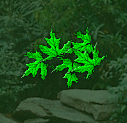


Using Mulch in Managed Landscapes
Conversely, decomposition of organic matter with C:N ration less than 30:1, which contains more nitrogen than required to support microbial growth, increases the availability of nitrogen for plants. Researchers at Ohio State University confirmed these responses in a comparison of two organic mulches that differed dramatically in a C:N ratio: ground wood pallets with a C:N ratio greater than 100:1 and composted yard waste with a C:N ratio greater than 17:1. After only one season, both mulches increased soil organic matter and microbial biomass. The effects of the two mulches on nitrogen availability, however varied dramatically. Mulching with ground wood pallets induced a nitrogen deficiency in river birch, yew and rhododendron, as evidenced by decreases in both foliar nitrogen concentration and plant growth. On the other hand, mulching with composted yard waste substantially increased total soil nitrogen mineralization rate, which increased the growth of all three species. Because many factors should be considered when deciding how deep to mulch, general recommendations are not possible. The optimal depth of mulch will vary depending on soil texture, climate, type of mulch, age of plants and management objectives. A thin layer of mulch does not suppress weeds or conserve moisture as effectively as a deeper layer. A thin layer also needs to be replenished more often, which increases maintenance costs. An excessively deep mulch layer can promote water logging of heavy soils, decrease soil oxygen levels, result in shallow rooting and keep soils too warm during winter. A 3 to 4" layer of mulch applied to well-drained soils in seasonally dry climates can help minimize drought stress. However, 1 2 to 3" layer is more appropriate on heavy soils in regions where rainfall is more frequent.
If mulch is piled too deep, or if its texture is fine, air may not be able to penetrate the mulch layer, and the underlying soil becomes depleted of oxygen. In field studies at the Morton Arboretum at Cornell University, soil oxygen depletion under wood chips was minimal even when mulch was piled as deep as 10 to 18", but finer texture mulches of similar depth are likely to block oxygen movement to the soil because the mulch itself uses all the available oxygen. The Cornell study also found that 3" of mulch suppressed almost all weed growth and resulted in more shoot growth on transplanted white pine and pin oak saplings than either an unmulched treatment or mulch applied to depth of 6 to 10". Excessively deep mulch also can encourage shallow rooting due to excessive water accumulation and low oxygen concentration in the underlying soil.
Mulch piled high against tree trunks has become a common sight in newly installed landscapes. There are persuasive reasons to avoid this practice, however. Trunks encircled by mulch stay constantly moist, a condition to which they are not adapted. Continuous moisture is harmful because it interferes with respiration or cambium phloem, and other living cells in the trunk by limiting their exchange of oxygen and carbon dioxide with the atmosphere. The practice also creates conditions that favor infection by pathogens that cause fungal cankers and root rots, especially if there are trunk wounds under the mulch. Mulch should be spread from near the trunk outward to the dripline, not pile up like a volcano.
Adapted from Ohio State University Bulletin 894 by Daniel Herms, Ohio State University; Mark Gleason, Jeff Iles and Donald Lewis, Iowa State University; Harry Hoitink OSU; and John Hartman, University of Kentucky
|
|
